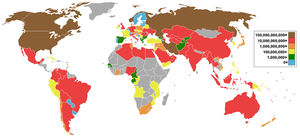- Image via Wikipedia
It is currently estimated that natural gas resources will be exhausted in 130 years; however, those reserves where extraction is cost-effective will only flow for another 60 years or so. Scientists at the Max Planck Institute for Coal Research and at the Max Planck Institute of Colloids and Interfaces might be helping to make it worthwhile to tap into previously unused resources. They have developed a catalyst that converts methane to methanol in a simple and efficient process.
Methanol can be transported from locations where it is not economical to build a pipeline.
It is not cost-effective to lay pipelines to remote or small natural gas fields; nor is it worthwhile accessing the methane in coal seams or in gas sand, or which is burned off as a by-product of oil production, although the methane burned off throughout the world could more than satisfy Germany’s requirement for natural gas. It is also too expensive to liquefy the gas and transport it on trains or in tankers — and even chemistry has so far been unable to offer a solution. Although there are chemical ways to convert methane to methanol, which is easy to transport and which is suitable as a raw material for the chemical industry, “the processes commonly used up to now for producing diesel fuel — steam reforming followed by methanol synthesis or Fischer-Tropsch synthesis — are not economical,” says Ferdi Schüth, Director at the Max Planck Institute for Coal Research in Mülheim an der Ruhr. He and his colleagues have been working with Markus Antonietti and his team at the Max Planck Institute of Colloids and Interfaces in Potsdam to develop a catalyst that might change all this.
Related articles by Zemanta
- Better Gas-to-Methanol Catalyst (technologyreview.com)
- Gas To Liquids Technology By Valerie Sage (slideshare.net)
- China and Russia Seek Pact on Oil and Natural Gas (time.com)
![Reblog this post [with Zemanta]](http://img.zemanta.com/reblog_b.png?x-id=bc89f7dd-c849-4b2f-bdd3-10d6fbf4d95a)








